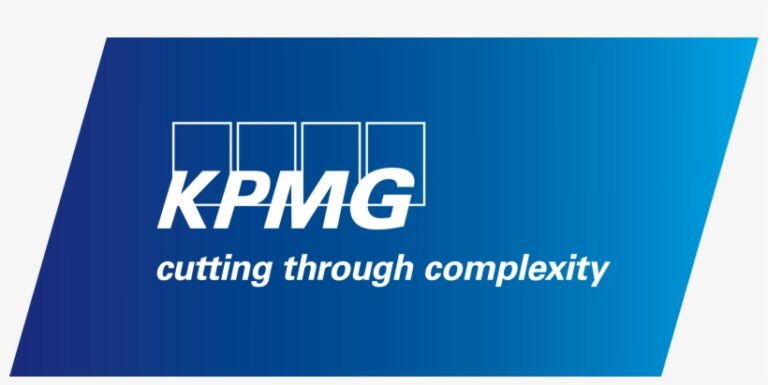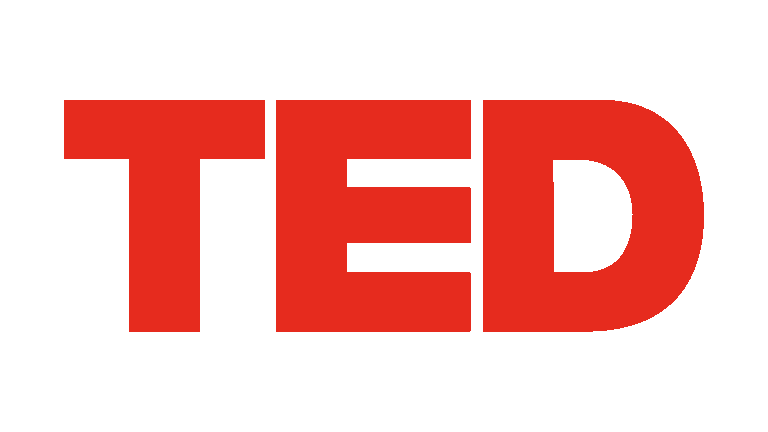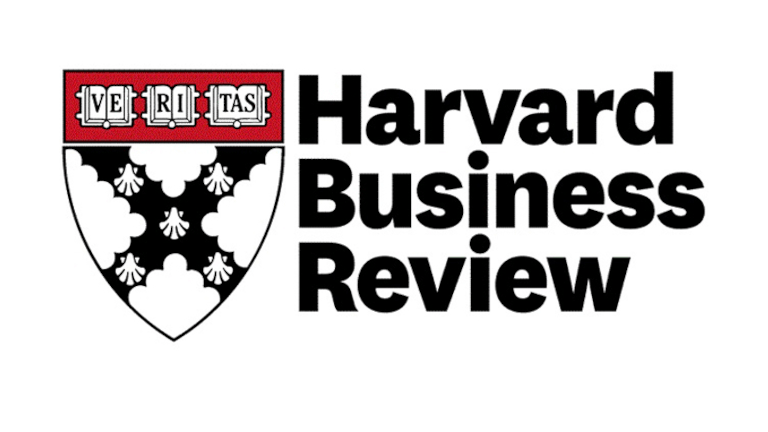Lessons From Mount Stupid
A few months ago, I was asked to conduct a Workshop, deliver a Keynote, and Chair a three-day Conference on Manufacturing Process Excellence in Europe, produced by the Process Excellence Network (PEX), a division of IQPC, and held in Munich, Germany. Although that was a lot to ask of me, the line-up of speakers and content was pretty strong and I was looking forward to gaining knowledge as much as I was delivering what I had to offer.
During the Conference, I had the opportunity to meet one of the speakers who was the Director of Operational Excellence in Europe for a publicly-traded company – which is not so unusual, as most of the speakers and attendees were in Operational Excellence (or Continuous Improvement) leadership roles. He was a bright and passionate individual for sure, and we promised to have a follow-on conversation in a month’s time.
When it came time for the follow-up call, the much learn’d and passionate individual told me that he had been released. Being rather shocked, I asked what had happened. He told me the company had killed the entire Operational Excellence program to “cut costs”. Hmmm… and so it goes.
Believe it or not, I see this more often than you might imagine; Operational Excellence programs being cut or killed to save costs, Continuous Improvement programs ceasing to be “continuous”, Lean and Six-Sigma programs being starved of oxygen – the incredible (read: impossible) demands of corporate leadership on the improvement teams to accomplish grand goals with little or no support, and the more incredible acceptance of the demands under such conditions by the improvement team leadership.
Here, I don’t place responsibility for the miss-alignment of expectations of program-objectives versus ability-to-deliver on corporate leadership, though. I am more inclined to place responsibility for the pending doom on the leadership of the improvement teams for not understanding what is being asked of them, and what they truly need to accomplish the task. In essence, they are setting themselves up for failure – being held accountable and responsible, but without authority – before they even start.
You want me to fight a desperate battle against incredible odds – where do I sign up?!
There is a reason that young people join the armed services, bungee-jump, and participate in extreme sports much more often than older folks; they don’t know any better, it looks sexy, and participation feeds the ego. If a few others to join, a crowd mentality forms, and a frenzy often follows. These people are often referred to as “adrenaline junkies” – they love the rush of excitement and challenge of facing the peril.
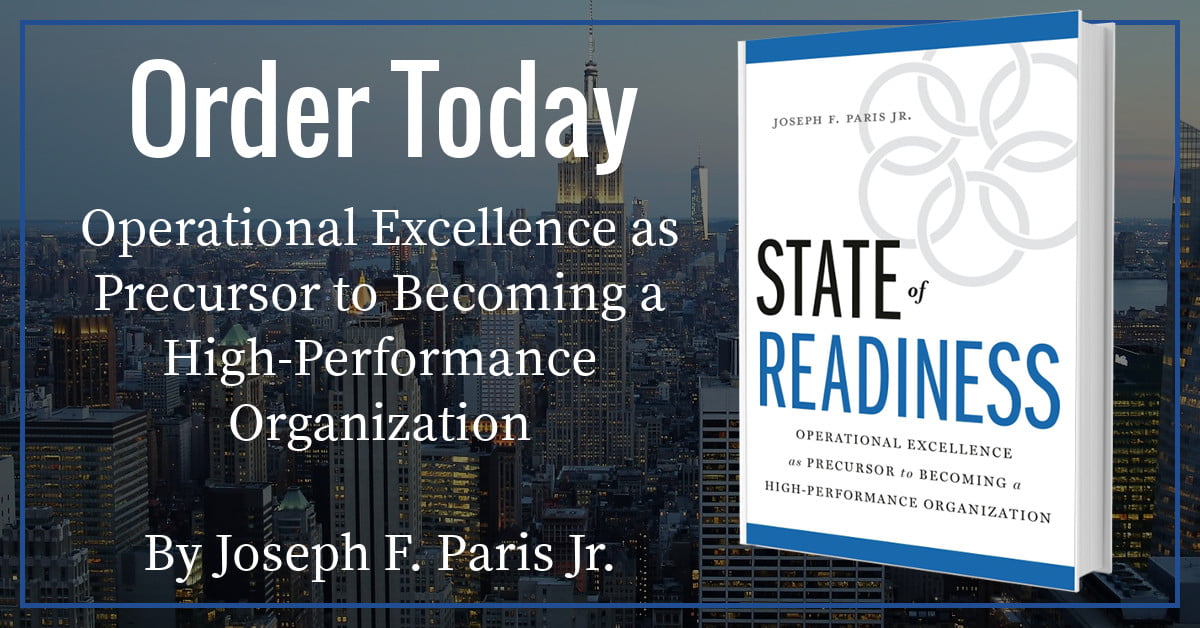
Oftentimes, they will engage in the activity long before they have the capability for success. In fact, getting slightly injured is looked upon as a badge of honour; “proof”, if you will, that the experience was in fact perilous, they had overcome, and they have the “t-shirt to prove it.”
My sons like to downhill bike; which is basically sitting on a bike and letting gravity accelerate you down a rocky mountain path at pretty darn close to 10m/sec/sec with only a near imagined ability to control the plummet by steering and breaking.
When they are done with a ride, they don’t come back home and talk about all the successful runs they had. They will talk of the wipe-outs and near misses – they show-off the tears in their clothing or dents in their helmets, or scrapes and bruises they “earned”. Smiling all the time.
If you squint real hard, you can see success from the peak of Mount Stupid.
Inspired by the case of McArthur Wheeler – who rubbed lemon juice on his face before he robbed banks in the misguided belief that the cameras would not be able to record him during the robbery – David Dunning and Justin Kruger of the Psychology Department at Cornell University in Ithaca, New York observed a pattern of behavior where an ignorance of real requirements led to overestimation of capabilities – oftentimes in the extreme.
There had been references to such misguided belief going back to antiquity;
- “Real knowledge is to know the extent of one’s ignorance.” – Confucius
- “Ignorance more frequently begets confidence than does knowledge.” – Charles Darwin
- “One of the painful things about our time is that those who feel certainty are stupid, and those with any imagination and understanding are filled with doubt and indecision.” – Bertrand Russell
In 1999, Dunning and Kruger released a study – of what came to be known as the “Dunning-Kruger Effect” – that proposed, for a given challenge, incompetent people will pursue a path born out of ignorance with great confidence until it is glaringly apparent that the path is wrong – with the resultant realization setting their confidence into a deep devaluation before the process of rebuilding can occur.
Setting off on the Journey
Embarking on a new venture, breaking new ground (even if it’s not necessarily new, just new to the participants) is a very exciting time. Everyone is excited; they “psych” themselves up to face the challenge, to face the unknown, to have an attitude of a conqueror.
But are those selecting the individuals to complete the task selecting the right people?
The selection process is the most critical step when formulating the members of the team – especially those initial members who will form the core, the leadership, of the team. During the interview, the interviewer will want to select the individual whose credentials and experience satisfy the prima facie requirements – but will gravitate towards selecting the most confident and gung-ho person they can find.
They will listen with great interest to the person who has a general understanding of the challenge and who possesses a “can-do/is-done” attitude over the person who is more cerebral, contemplative and modest – to risk taking the poorest performers who are uniquely unaware of their own inability over the more capable person who is consciously cognizant of the reality of the challenge and more reserved.
Climbing Mount Stupid
And so our ambitious – though unlearn’d and unprepared – adventurer begins his ill-conceived journey up the slope of Mount Stupid. Subtle warnings that he might not be on sound footing go largely ignored. Instead, he:
- overestimates his own level of skill because he doesn’t know any better;
- fails to recognize genuine skill in others because he doesn’t realize his own shortcomings;
- fails to recognize the extremity of his inadequacy because he can’t measure what he doesn’t know.
Reaching the Peak of Mount Stupid
More often than not, and directly related to his level of confidence and the size of his ego, our adventurer’s realization that he lacks the skills or knowledge become apparent when the decisions he has made, or course he is on, is incontrovertibly incorrect – he has reached the “Peak of Mt Stupid”. Here, he finally is faced with, and must acknowledge, his own lack of skill and capability. “Everyone has a plan – until they get punched in the face” – Mike Tyson
Falling from the peak
Depending upon how high our adventurer has climbed and the magnitude that he allowed his misguided confidence and ego to drive him beyond the reasonable, the fall from the peak can be a gentle stroll down a hill, or falling off a cliff. It is at this point that the misalignment of the expectations to the results is glaringly apparent with the Operational Excellence Program, and those involved, become de minimis or outright terminated. But this failure, though predestined, is not of nefarious intent. Indeed, it subscribes to Hanlon’s Razor; “Never attribute to malice that which is adequately explained by stupidity.” (Folks would be wise to remember this when reading posts on Facebook).
A contemporary example of a Board of Directors selecting arrogance over competence – and the subsequent fall from Mount Stupid – is the story of JC Penney, a retail store, and Ron Johnson. JC Penney had been struggling for several years with the condition of its business becoming increasingly tenuous. It was time for a change in leadership at the top.
In November of 2011, the Board of Directors decided to hire Ron Johnson as CEO. Johnson had been Senior Vice President of Retail Operations of Apple, during which time Apple’s retail operation grew from nothing to being an envy of the retail industry – with profits that never seemed to stop growing.
When the hiring of Johnson was announced, JC Penney’s stock rose almost 25%. But Johnson ignorance of the industry was only surpassed by his arrogance. The first signal should have been Johnson’s insistence of “commuting to work”, from California to Texas, on a private jet.
Although the leadership of JC Penney was loath to admit a mistake had been made, especially Johnson, it soon became glaringly apparent that Johnson and his strategies – instead of being on the path to salvation – were actually accelerating JC Penney on the path to destruction. Often described as “one of the most aggressively unsuccessful tenures in retail history”, Johnson’s rebranding and revitalization efforts were ambitious, but could not be supported by cash-flows. In addition, Johnson’s plans served to push away the customers loyal to JC Penney in pursuit of an undefined expanded customer base.
Ultimately and facing doom, JC Penney terminated Johnson in April of 2013. I could not find what he is doing now, but he made $400 million while at Apple – so maybe he is selling spirit-stones in Sedona.
Valley of Despair
Eventually, our adventurer completes his fall and finds himself at the bottom. He has lost all confidence in himself and his beliefs. At this point, he has to make a decision; does he re-assess his circumstances and begin to take corrective action? Or does he give up?
… And what about the company? Does it assess its experiences and re-engineer and redeploy the Operational Excellence Program? Or does it eliminate it to “reduce costs”?
Probably the best example of a visit to the “valley of despair” is the story of Steve Jobs and the company he co-founded with Steve Wozniak, Apple Computer. Soon after Apple Computer went public, the Board of Directors became uncomfortable with its leader being rather inexperienced in business – especially a publicly-traded company looking to transition from an entrepreneurial start-up to a mature enterprise. The result was that Steve Jobs was unceremoniously discharged from the company he helped to create.
But Steve Jobs did not wallow in self-pity for long. First, he took his fortune and started NeXT Incorporated. With the help of Ross Perot, NeXT Incorporated was eventually sold to Apple. Afterwards, Steve Jobs bought The Graphics Group from LucasFilm (which he renamed Pixar), helped to make the company a huge success, and parlayed his investment into his being the largest private investor of the Walt Disney Company (7%) and a seat on the Disney Board of Directors.
In 2000, with Apple Computer facing a life-and-death struggle, the Board of Directors of Apple Computer asked Steve Jobs to rejoin the company – eventually becoming President and CEO.
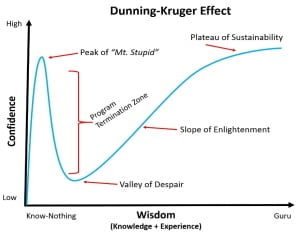
Slope of Enlightenment
Let’s assume that our adventurer does not give-up his career as a change-agent to live off the land and sell “spirit stones” in Sedona – but instead he decides to reflect on his experience, and discover the Tao (the way).
In this phase, he performs a self-assessment of his beliefs and capabilities. He compares them with what is needed for him to achieve his goals. And he goes about acquiring the capability (either personally or by proxy).
Plateau of Sustainability
In this final phase, real sustainability is achieved. There is no fanfare. There is no panic or talk of a “burning platform”. There is just cerebral and methodical forward movement in a continuous and deliberate manner – to “Keep Calm and Carry On“.
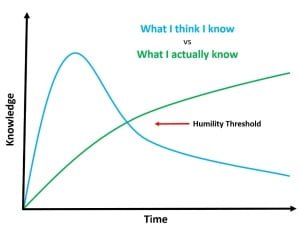
The humble servant leader
But there is something magical that also happens to our adventurer. His experience has taught him that he does not know nearly as much as he thought he did and – striped of hype and hubris – his confidence has been set to be more aligned with reality.
Over time, even as he learns more and more, he realizes his knowledge in absolute terms is less and less. He has become humble and wise.
And now, a true mentor, he can be a positive and indelible force within the world.
The Hegelian Dialectic
In my opinion, the Dunning-Kruger effect is, in fact, a variant application of the Hegelian Dialectic, a form and method for argument and reasoning, named after Georg Wilhelm Friedrich Hegel, a German Philosopher who lived from 1770 to 1831 who is credited with its formation and development.
The Hegelian Dialectic is usually described in three phases;
- a thesis, a new paradigm – usually a transformational challenge to the status-quo,
- an antithesis, which contradicts or negates the thesis,
- and the reconciliation of the two being resolved by means of a synthesis.
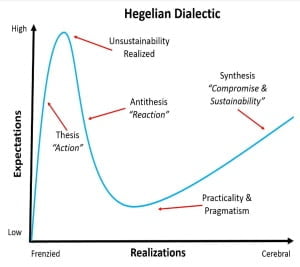
We see this pattern repeat itself throughout history. A most glaring example in contemporary times came with the introduction of the internet.
Thesis
In the later 1990’s the internet was the next undiscovered country – a technical “Wild West” where everything and anything was possible and without boundaries without limitation.
Soon, the “hype” turned into a frenzy as start-up after start-up promised great fortunes in the new economy of “dot-coms” and scoffed at those companies still dependent on “bricks and mortar”.
It did not matter that these cyber-“young Turks” and their fledgling companies were losing money by the barrelful. In their “new economy”, cash didn’t matter – what mattered was “eyeballs to the website”. And the CEO’s of these new-economy companies, when challenged, would scoff arrogantly at the “ignorant old-timers” who just didn’t understand. Investment money kept pouring into these companies chasing revenue and profitability numbers that had no basis in reality. At one point, a company called e-Stamps, which sold stamps over the internet, was valued at more than the US Postal Service – how can that possibly be?
The mantra of this thesis became, “If you are not an internet company, you are a dinosaur business and about to become extinct”. The euphoria drove the stock-prices of the dot-coms to unrealistic and unsustainable levels – a bubble had formed.
Antithesis
Suddenly and spectacularly, the “dot-com bubble” exploded in 2001 and the companies whose fall from grace was so swift and remarkable became known as “dot-bombs”. Billions of dollars, if not trillions, were lost in a very short time by investors across the spectrum – from the institutional investor to the investment novice. The once mighty CEO’s of these companies, who at once time demonstrated such hubris in their new economy with little patience for those who did not understand, were exposed for the arrogance in their ignorance.
Afterwards, the investor backlash against all businesses and business models that relied on the internet were anathema. The opinion on business changed from, “If you are not an internet business, you are soon to be extinct” to, “If you are an internet business, you are not a real business”.
Synthesis
But, over time, more pragmatic eyes looked beyond the hype of the internet and focused on the realistic potential and power that did exist. The market matured, and so did the business models, giving us innovative companies like Google, social media companies like Facebook and LinkedIn and transforming the travel industry in its entirety (to name a few). And although users and “eyeballs to the website” are important, they are secondary to Earnings Before Interest, Taxes, Depreciation and Amortizations (EBITDA) and Free Cash-Flow Generated from Operations – you know, the boring “old-economy” stuff.
So what can we learn from this? And how can we apply it to our Operational Excellence Programs?
- If this is your first attempt at Operational Excellence (or Continuous Improvement, Lean, Six-Sigma, etc.), make every attempt to set pragmatic goals. Hire the cerebral and the deliberate over the emotionally super-charged. Listen to them and give them the support they need. Realize that everyone’s expectations will probably not be met.
- If you have climbed and fallen from Mount Stupid, or are about to; brush yourself off and take a moment to reflect on the journey. What was good? What was not so good? How can we build on the successes? How can we ensure the failures do not recur? After all, the only alternatives to moving forward are to stand still or go backwards – and you know your competitors (and the marketplace) are not going to follow suit.
- Get going again. Move forward with your new-found expertise and wisdom.
- Achieve a sustainable program in both pace and impact.
In all things, in all initiatives, in all great aspirations, one should: evaluate critically, consider cerebrally, prepare calmly, and act deliberately – always keeping in mind that; “Pride goeth before destruction, and an haughty spirit before a fall.” – Proverbs 16:18
By Joseph F Paris Jr
Reference and additional reading:
Psychology Today: When Ignorance Begets Confidence: The Classic Dunning-Kruger
PsyBlog: The Dunning-Kruger Effect: Why The Incompetent Don’t Know They’re Incompetent
Pacific Standard Magazine: Why People Have So Much Trouble Recognizing Their Own Incompetence
ARS-Technica: Revisiting why incompetents think they’re awesome
[citation needed]: What the Dunning—Kruger effect is and isn’t
Huffington Post: The Dunning-Kruger Effect
Paris is the Founder and Chairman of the XONITEK Group of Companies; an international management consultancy firm specializing in all disciplines related to Operational Excellence, the continuous and deliberate improvement of company performance AND the circumstances of those who work there – to pursue “Operational Excellence by Design” and not by coincidence.
He is also the Founder of the Operational Excellence Society, with hundreds of members and several Chapters located around the world, as well as the Owner of the Operational Excellence Group on Linked-In, with over 40,000 members.
Connect with him on LinkedIn




